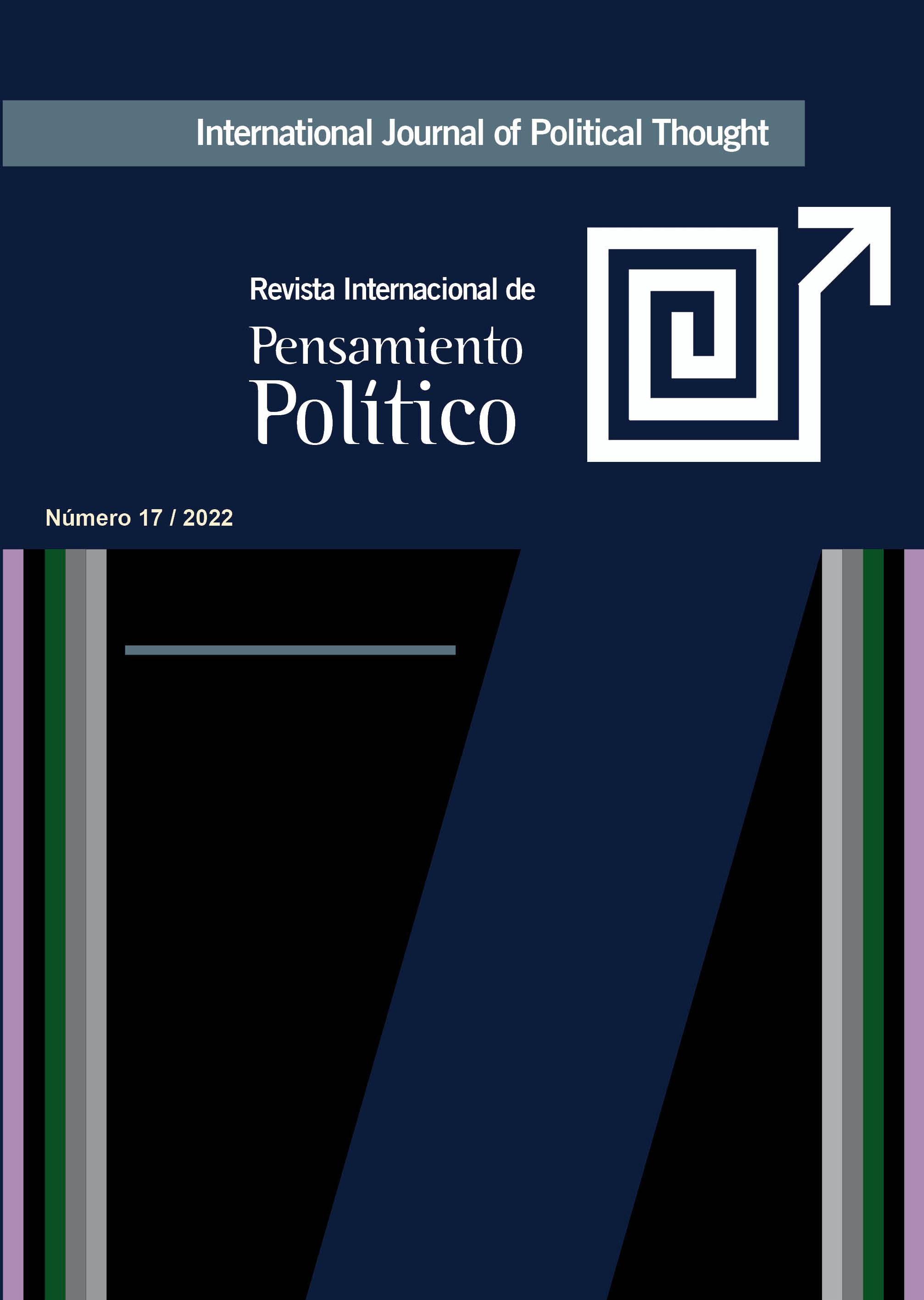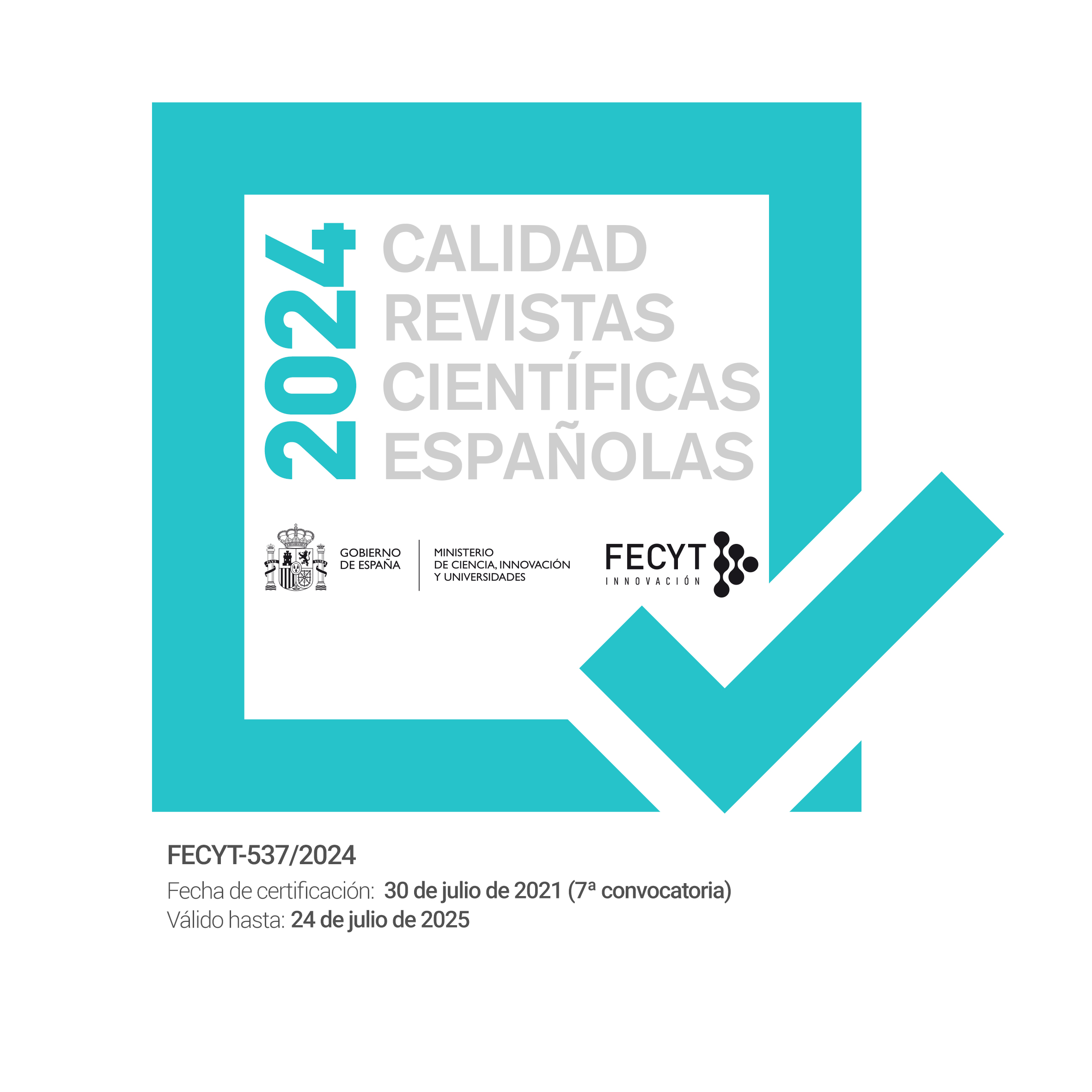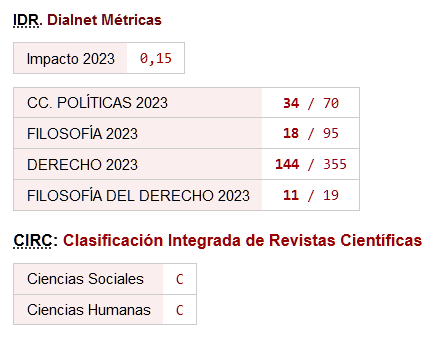Legitimization of Terrorism
Opinion of Basque University Youth after the Dissolution of ETA
DOI:
https://doi.org/10.46661/revintpensampolit.6339Keywords:
Basque youth, legitimization of violence, terrorism, ETA, public opinionAbstract
This article presents the results of a survey carried out in December 2020 in which a questionnaire was answered by Basque university youth on the topic of the legitimization of ETA terrorist violence. Contrary to previous surveys, this study was carried out after the official dissolution of ETA in 2018. 1,067 valid responses were obtained from young women and men between 18 and 25 years old residing in the Basque Country. The results confirm that most of the answers reject the use of violence as a political tool, but the youngest generations and those who identify themselves as only Basque express less forcefulness and less determination in the delegitimization of the existence of ETA.
Downloads
References
Apter, D. (1997). The legitimization of violence. New York: New York UP.
Bullain, I. (2011). Revolucionarismo patriótico: El Movimiento de Liberación Nacional Vasco (MLNV). Origen, ideología, estrategia y organización. Madrid: Fragua.
Bourne, A. (2010). “Securitization and the Proscription of Terrorist Organizations in Spain,” Terrorism and Political Violence, 30(2), 318-335. https://doi.org/10.1080/09546553.2018.1432218
CMVT – Centro Memorial de las Víctimas del Terrorismo (2017). La sociedad vasca ante la memoria de las víctimas y el final del terrorismo. Avance de resultados. Informe número 2. https://www.ehu.eus/documents/1457190/1547454/informe+centro+memorial+y+euskobarometro.pdf/8c93924f-20f7-44c4-a4fb-25153f816202;
Crenshaw, M. (2011). Explaining Terrorism: Causes, Processes and Consequences. New York: Routledge.
Crespi, I. (2009). The Public Opinion Process: How the People Speak. New York: Routledge.
Criado, H. (2011). “Bullets and Votes: Public Opinion and Terrorist Strategies,” Journal of Peace Research, 48(4), 495-508. https://doi.org/10.1177/0022343311406571
Davis, P.; Larson, E; Haldeman, Z.; Oguz, M. & Rana, Y (2012). Understanding and Influencing Public Support for Insurgency and Terrorism. Santa Monica, CA: RAND.
Elzo, J. (2014). “Los jóvenes vascos ante la violencia de ETA y otras manifestaciones ilegítimas de violencia de signo político (1986-2012),” Metamorfosis. Revista del Centro Reina Sofía sobre Adolescencia y Juventud, (March 2014), 26-46.
Fernández Soldevilla, G. (2016). La voluntad del gudari. Génesis y metástasis de la violencia de ETA. Madrid: Tecnos.
Fundación Centro para la Memoria de las Víctimas del Terrorismo (2016). Cuadernos del Centro memorial de las víctimas del terrorismo 1. Vitoria-Gasteiz: MIC.
Funes, M. (1998). “Social Responses to Political Violence in the Basque Country: Peace Movements and Their Audience,” Journal of Conflict Resolution, 42(4), 493-510. https://doi.org/:10.1177/0022002798042004005.
García, I. (2018). “The Strategic Communication Power of Terrorism: The Case of ETA,” Perspectives on Terrorism, 12(5), 27-35.
Gobierno Vasco (2012a). Sociómetro vasco 48 – Fin del terrorismo. Vitoria: Gabinete de Prospección Sociológica. Presidencia del Gobierno Vasco. https://www.euskadi.eus/contenidos/documentacion/sociometro_vasco_48/es_soc48/adjuntos/12sv48_es.pdf
Gobierno Vasco (2012b). Retratos de Juventud 16 – Cultura Democrática. Vitoria; Observatorio Vasco de la Juventud. Presidencia del Gobierno Vasco. https://www.euskadi.eus/contenidos/documentacion/retratos_de_juventud_16/es_retjuv16/adjuntos/12retratos16_es.pdf
Gobierno Vasco (2014) Sociómetro vasco 54 – Paz y Convivencia. Vitoria: Gabinete de Prospección Sociológica. Presidencia del Gobierno Vasco. https://www.euskadi.eus/contenidos/documentacion/sociometro_vasco_54/es_soc53/adjuntos/14sv54.pdf;
Hayes, B. & McAllister, I. (2001): “Sowing Dragon’s Teeth: Public Support for Political Violence and Paramilitarism in Northern Ireland,” Political Studies, 49(5), 901 – 922. https://doi.org/10.1111/1467-9248.00346
Krueger, A. & Maleckova, J. (2003). "Education, Poverty, Political Violence and Terrorism: Is There a Causal Connection?" Journal of Economic Perspectives, 17(4), 119-144. https://doi.org/10.3386/w9074
López, W. and Sabucedo, J. M. (2007). “Culture of peace and mass media,” European Psychologist, 12(2), 147–155, 154. https://doi.org/10.1027/1016-9040.12.2.147
Llera, F. (2010). “Public Opinion and Terrorism: The Spanish Experience,” In G. Castro and J. de Miguel, (Eds)., Spain in America (pp. 211-223). Madrid: Fundación ENDESA.
Malečková, J. & and Stanišić, D. (2011). “Public opinion and terrorist acts,” European Journal of Political Economy, 27(1), 107-121. https://doi.org/10.1016/j.ejpoleco.2011.04.001
Mateo. E. & Pérez, J. A. (2014). Políticas de memoria. Qué, cómo y para qué recordar Vitoria: Fundación Fernando Buesa and Instituto de Historia Social Valentín de Foronda.
Mees, L. (2019). The Basque Contention: Ethnicity, Politics, Violence. London: Routledge.
Mousseau, M. (2003). “Market Civilization and Its Clash with Terror,” International Security, 27(3), 5–29. https://doi.org/10.1162/01622880260553615
Rosenfeld, J. (2011). Terrorism, Identity and Legitimacy: The Four Waves Theory and Political Violence. New York: Routledge.
Sabucedo, J.M.; Rodríguez, M. and Fernández, C. (2002). “Construcción del discurso legitimador del terrorismo”, Psicothema, 14, 72-77, https://reunido.uniovi.es/index.php/PST/article/view/7963.
Sánchez-Cuenca, I. (2007). “The Dynamics of Nationalist Terrorism: ETA and the IRA,” Terrorism and Political Violence, 19(3), 289-306. https://doi.org/10.1080/09546550701246981
Snow, D.; Hunt, S. and Bendford, R. (1998). “Marcos de acción colectiva y campos de identidad en la construcción social de los movimientos”. In E. Laraña and J. Gusfield (Eds.), Los nuevos movimientos sociales. De la ideología a la identidad (pp. 221-249). Madrid: CIS.
Spencer, A. & Croucher, S. (2008). “Basque Nationalism and the Spiral of Silence: An Analysis of Public Perceptions of ETA in Spain and France,” International Communication Gazette, 70(2), 137–153. https://doi.org/10.1177/1748048507086909
Usón, I. (2017). “Terrorismo y vulneraciones de Derechos Humanos de motivación política en el caso vasco: estudio exploratorio sobre los conocimientos y la valoración ética de la juventud universitaria vasca,” Deusto Journal of Human Rights, 2, 121-148, 141. http://dx.doi.org/10.18543/djhr-2-2017pp121-148
Van den Broek, H. P. (2004). “BORROKA—The Legitimation of Street Violence in the Political Discourse of Radical Basque Nationalists,” Terrorism and Political Violence, 16(4), 714-736. https://doi.org/10.1080/095465590885141
Whitfield, T. (2014). Endgame for ETA. Elusive Peace in the Basque Country. New York: Oxford UP.
Downloads
Published
How to Cite
Issue
Section
License
Copyright (c) 2022 Pilar Rodríguez Pérez

This work is licensed under a Creative Commons Attribution-NonCommercial-ShareAlike 4.0 International License.
Open access policy
Free and open access is allowed to any interested party to all the contents of the journal issues, free of charge, being able to print and transfer all the articles, with the only condition of specifying the source and authorship.
The journal: a) does not charge authorship costs for the processing of articles or for their submission, b) maintains copyright for authors without restrictions, c) facilitates authors to keep their publication rights without limitations.
The International Journal of Political Thought is an original work of the Laboratory of Political Ideas and Practices of the Pablo de Olavide University. All articles included in the Journal are original work of their respective authors. This Journal is freely offered to the scientific and academic community at no cost and releases the contents according to the license "Attribution-NonCommercial-ShareAlike 4.0 CC BY-NC-SA" of the Creative Commons project available in the following url: https://creativecommons.org/licenses/by-nc-sa/4.0/legalcode
If you wish to translate or compile any of the articles available here, please contact us at contacto













 ISSN: 1885-589X
ISSN: 1885-589X  Universidad Pablo de Olavide
Universidad Pablo de Olavide